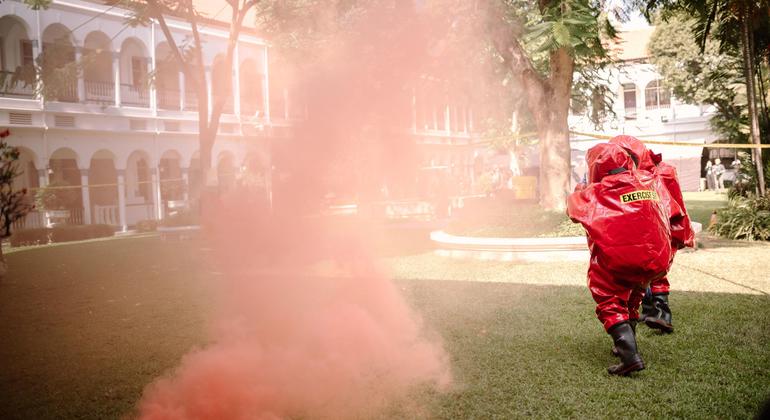Chemical terrorism poses a very real threat to countries all over the world, including Indonesia. With the rise of terrorist groups using chemical weapons in attacks, it is crucial for governments and the private sector to be prepared to respond effectively to such incidents. In an effort to enhance their readiness, Indonesia has been conducting simulation exercises to test their capacity to handle chemical terrorist attacks.
In Semarang, Indonesia, a recent simulation exercise brought together representatives from government agencies and the private sector to respond to a fictional chemical terrorist attack. The scene was chaotic as train passengers began to feel nauseous, some were unable to breathe, and others fainted. A group of individuals dressed in orange astronaut-like suits arrived on the scene, indicating the presence of a potential bomb threat.
Niki Esse de Lang, the UNODC’s regional counter-terrorism coordinator for Southeast Asia and the Pacific, emphasized the importance of being prepared for chemical terrorism. She highlighted the need for a solid, integrated response from all relevant actors to effectively counter this threat.
The simulation exercise in Semarang was organized by UNODC and the National Counter Terrorism Agency of Indonesia, with the support of Indonesia’s National Police Mobile Brigade. This exercise was one of several that have taken place in the country in recent months to assess and improve Indonesia’s response capabilities to chemical terrorism.
Since 2011, Indonesia has experienced at least eight chemical terrorism incidents, highlighting the urgency of being prepared for such attacks. Additionally, terrorist groups like ISIL have used chemical weapons in other countries, further underscoring the need for countries to be vigilant and ready to respond to chemical threats.
Chemicals that are commonly used in legitimate industries, such as mining, agriculture, and pharmaceuticals, can also be used by terrorists to create chemical weapons. For example, chlorine, which is commonly used in water treatment facilities, can be weaponized to produce a toxic chemical weapon. This underscores the importance of strong cooperation between governments and the private sector on a national, regional, and international level to combat this complex threat.
During the simulation exercise in Semarang, responders from various units and agencies worked together to contain the threat. Some were tasked with establishing a control area, setting up decontamination stations, and providing medical aid. Others used tactical equipment to measure air and surface contamination levels, while a team marked perimeters based on the detected contamination levels.
A miniature car equipped with sensors and cameras circulated the scene, taking samples to help experts determine toxicity levels. Meanwhile, a team dressed in yellow suits underwent decontamination procedures before removing their protective gear. Responders from the police, military, counter-terrorism units, bomb disposal teams, medical personnel, and public infrastructure security worked together to address the simulated chemical terrorism threat.
It was evident during the exercise that no single entity can effectively respond to a chemical terrorism incident alone. It requires a collaborative effort involving various stakeholders, including security forces, government agencies, and the private sector. All must be prepared and trained to handle the complexities of a chemical terrorism incident.
The simulation exercise in Semarang served as a valuable opportunity for Indonesia to assess and enhance its response capabilities to chemical terrorism. By conducting such exercises, countries can identify gaps in their response plans, improve coordination among different agencies, and ensure that they are prepared to effectively respond to the threat of chemical terrorism.
Moving forward, it is essential for countries like Indonesia to continue investing in training and preparedness measures to address the evolving threat of chemical terrorism. By building strong partnerships between governments and the private sector, countries can enhance their ability to prevent, detect, and respond to chemical terrorist attacks effectively.









